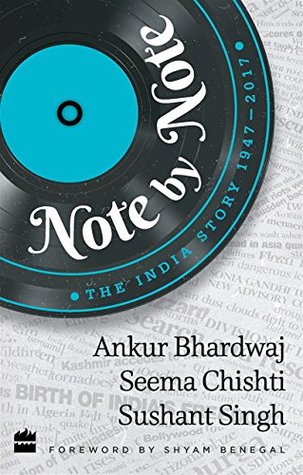Kindle Notes & Highlights
by
A. Bhardwaj
Read between
September 26, 2018 - January 4, 2019
B.V. Keskar, an austere Brahmin and classical music purist, thought the Hindi film music of that time was vulgar, cheap and overly westernized. This led to the birth of the Hindi film music service of Radio Ceylon, which was a station originally set up by the Government of Ceylon – now Sri Lanka – as an Asia-wide commercial service.
Ameen Sayani.
Mountbatten later claimed, as quoted in Freedom at Midnight: ‘The date I chose came out of the blue. I chose it in reply to a question. I was determined to show I was master of the whole event. When they asked had we set a date, I knew it had to be soon. I hadn’t worked it out exactly then – I thought it had to be about August or September and I then went out to the 15th August. Why? Because it was the second anniversary of Japan’s surrender.’
Lata Mangeshkar, the voice that would go on to sing for four generations at least, went on to find her feet in Bombay, with her debut for Hindi films in Aap Ki Sewa Mein.
Another significant event this year was a first – the appointment of an Indian as the commander-in-chief of the Indian Army. Gen. K.M. Cariappa, who would become one of the only two field marshals India has had, took charge on 15 January, which day is now commemorated as Army Day.
This year saw the first amendment to the Constitution. A prominent journalist, Romesh Thapar, protesting the banning of Cross Roads, a left-wing journal from Madras, approached the Supreme Court to secure his freedom of expression – his right to write what he wished to, as per Article 19 of the Constitution. The court upheld his right.
There was, simultaneously, another matter of proscribing cartoons in the Organiser, a right-wing publication. The Supreme Court interpreted this as a violation of Article 19, an overreach which allowed the state to act against what ‘undermines the security of, or tends to overthrow, the State’.
This was also the year when a Calendar Reform Committee was set up under the Council for Scientific and Industrial Research to even out all calendars and come up with one calendar that could be an Indian calendar. Meghnad Saha, the scientist, was the chairman of the committee. The committee submitted its report in 1955.
The unified national calendar (Saka Calendar) eventually came into being with effect from on 1 Chaitra 1879 or 22 March 1957.
‘For what will it profit a man, if he gains the whole world, and loses his own soul?’
The first-ever no-confidence motion was moved in the Lok Sabha by Acharya Kripalani in August 1963 following the debacle in the war against China.
Seeds of the green revolution too were planted this year in a village on the outskirts of Delhi in November. Fifteen farmers of village Jaunti, planted Sonora 64 wheat.
After the failure of Operation Gibraltar, Pakistan launched Operation Grand Slam to capture Jammu and isolate Srinagar from the rest of India.
Tashkent Declaration signed on 10 January. India agreed to return key places like Haji Pir it had occupied during the war and to return to status quo ante as on 5 August 1965. There was an agreement on the return of prisoners, the resumption of diplomatic relations and an agreement that force would not be used to settle any future conflict. This declaration is especially important as it set aside the idea of a plebiscite over Kashmir as the way forward. It recognized the 1949 boundaries as acceptable ones.
A high power committee was set up by Indira Gandhi to examine the entire issue of a law to ban caw slaughter. Headed by former chief justice A.K. Sarkar, the committee had as its members Verghese Kurien and RSS chief M.S. Golwalkar among others. The committee failed to submit any report to the government.
In several states of northern India – Uttar Pradesh (UP), Bihar, Madhya Pradesh (MP) and Haryana – the Congress won, but with thin majorities, which allowed the idea of the Samyukt Vidhayak Dal (SVD), or United Legislators’ Party, to take root. This was a combination of the Jana Sangh, the Swatantra Party and the socialists, critically aided by breakaway Congress legislators, who came together just to grab power.
In May 1967, the Congress party passed a ten-point programme, strongly resonating her assumed socialist avatar; it spoke of the abolition of privy purses, the ‘social control’ of banking, ceiling on urban property, curbing of business monopolies – proposals that made the conservative Syndicate deeply uncomfortable, but which enabled Indira to chart an ideological course around which to argue her case against the old guard.
Honth pe liye hue, dil ki baat hum Jaagte rahenge aur, kitni raat hum Mukhtasar si baat hai, Tumse pyaar hai Tumhara intezar hai Tum pukar lo


